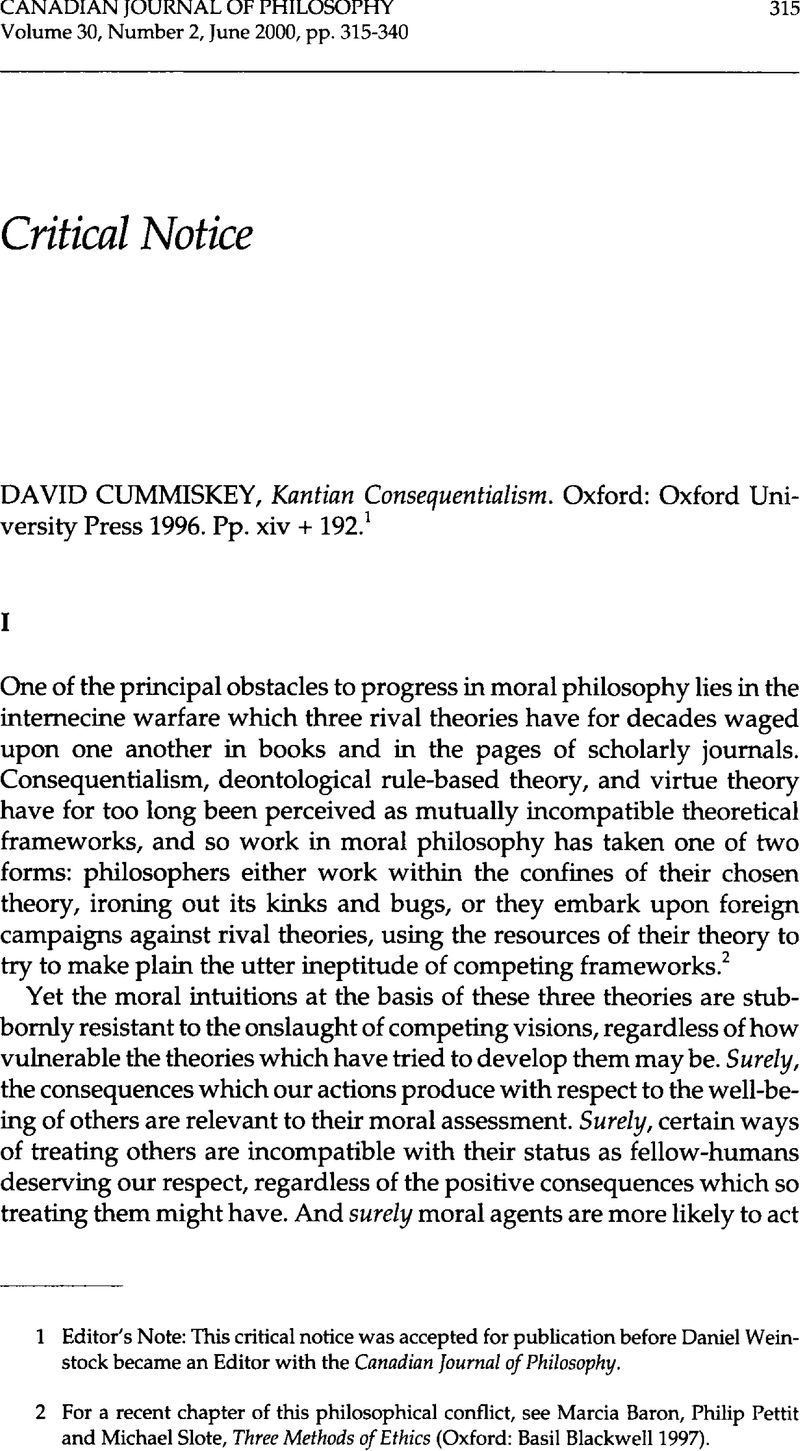Article contents
David Cummiskey, Kantian Consequentialism. Oxford: Oxford University Press 1996. Pp. xiv + 192.1
Review products
Published online by Cambridge University Press: 01 January 2020
Abstract

- Type
- Critical Notice
- Information
- Copyright
- Copyright © The Authors 2000
Footnotes
Editor's Note: This critical notice was accepted for publication before Daniel Weinstock became an Editor with the Canadian Journal of Philosophy.
References
2 For a recent chapter of this philosophical conflict, see Baron, Marcia Pettit, Philip and Slote, Michael Three Methods of Ethics (Oxford: Basil Blackwell 1997)Google Scholar.
3 More cursory treatments can be found in Harrison, Jonathan ‘Utilitarianism, Universalization, Heterotomy and Necessity or Unkantian Ethics,’ in Potter, N. and Timmons, M. eds., Morality and Universality (Dordrecht: D. Reidel 1985)Google Scholar and in Hare, R.M. ‘Could Kant Have Been a Utilitarian?’ in Dancy, R.M. ed., Kant and Critique (Dordrecht: Kluwer 1993)Google Scholar. Cummiskey's book will be referred to parenthetically in the body of the text.
4 For a clear and persuasive presentation of this interpretation, see Guyer, Paul ‘The Possibillity of the Categorial Imperative,’ Philosophical Review 109 (1996) 353–85Google Scholar.
5 References to Kant's Groundwork of the Metaphysics of Morals are to Paton, H.J. trans. (New York: Harper Torchbooks 1964)Google Scholar. They will be given parenthetically in the text, and will be referred to as Gr.
6 Hill, Thomas E. Jr., Dignity and Practical Reason in Kant's Moral Theory (Ithaca, NY: Cornell University Press 1992)CrossRefGoogle Scholar
7 For a thorough inventory of the contents of the Kantian concept of ‘humanity,’ see Hill, 39-41; see also Korsgaard, Christine Creating the Kingdom of Ends (Cambridge: Cambridge University Press 1996), 110–14CrossRefGoogle Scholar.
8 One response apparently available to Cummiskey would be to say that happiness as he conceives of it within Kant's theory of value cannot be equated to the realization of rationally-set ends, but rather should be thought of hedonistically, as characterizing agents’ psychic states, regardless of whether these states are produced by the attainment of ends. There is good evidence however to suggest that happiness so construed could not be the goal of moral action for Kant, since it ‘could have been brought about by other causes as well, and consequently [its] production did not require the will of a rational being’ (Gr, 401).
9 Note that Cummiskey's rejection of the ‘external stuff’ conception of Kantian value is in some tension with another part of his argument. In the final chapter of his book, Cummiskey argues that the unrestricted nature of Kantian consequentialism is such that it can in certain (admittedly exceptional) circumstances give rise to the obligation to sacrifice innocent rational beings, perhaps even oneself, if so doing allows one to save a greater number of rational beings. Cummiskey asks, rhetorically: ‘How can a concern for the value of rational beings lead to a refusal to sacrifice rational beings even when this would prevent other more extensive losses of rational beings?’ (146). Now an obligation to sacrifice one rational being if so doing allows one to save two only makes sense if we believe the following claim: it does not matter which specific set of individuals exist, as long as the set that does exist is as large as possible. But this claim seems neutral between (a) sacrificing an innocent rational beings so that two already existing rational beings survive, and (b) sacrificing an innocent rational being so that two new rational beings come to exist. (It would be quite easy to devise a science-fiction example in which this would be the alternative.) If this is the case, then Cummiskey's use of the ‘person-affecting’ restriction to block the unwanted implications of an ‘external stuff’ conception of value seems unattractively ad hoc.
10 O'Neill, O. Constructions of Reason (Cambridge: Cambridge University Press 1989)Google Scholar
11 Baron, M. Kantian Ethics Almost Without Apology (Ithaca: Cornell University Press 1995)Google Scholar
12 Murphy, L. ‘The Demands of Beneficence,’ Philosophy and Public Affairs 22 (1993) 267–97Google Scholar
13 See Allison, Henry Kant's Theory of Freedom (Cambridge: Cambridge University Press 1990)CrossRefGoogle Scholar, for the idea of ‘incorporation.’
14 Pettit, P. ‘Consequentialism,’ in Singer, P. ed., A Companion to Ethics (Oxford: Blackwell 1991)Google Scholar
15 Weinstock, D.M. ‘Natural Law and Public Reason in Kant's Political Philosophy,’ Canadian Journal of Philosophy 26.3 (1996) 389–411CrossRefGoogle Scholar
16 For accounts of objective theories, see Parfit, D. Reasons and Persons (Oxford: Oxford University Press 1984), 499–501Google Scholar; Griffin, J. Well-Being (Oxford: Oxford University Press 1986)Google Scholar, ch. III; Sumner, L.W. Welfare, Happiness and Ethics (Oxford: Oxford University Press 1996), ch.3Google Scholar.
17 For which see Griffin, J. ‘Modem Utilitarianism,’ Revue Internationale de Philosophie 7 (1977) 331–75Google Scholar.
18 For an instance of the complaint that objective theories merely provide lists without any accompanying theory, see Sumner, 45.
19 For some of the problems linked to maximization, and for some utilitarian responses to these problems, see Scarre, G. Utilitarianism (London: Routledge 1996), ch. VII.Google Scholar
- 1
- Cited by




